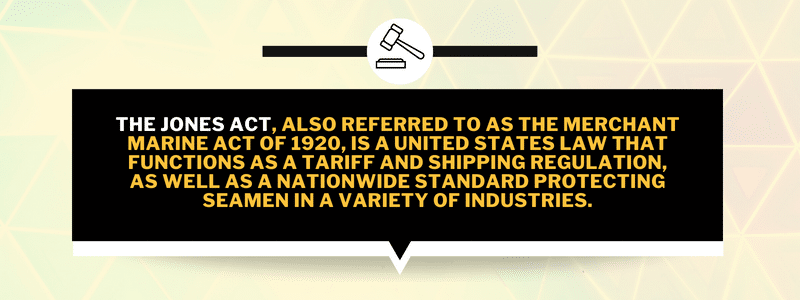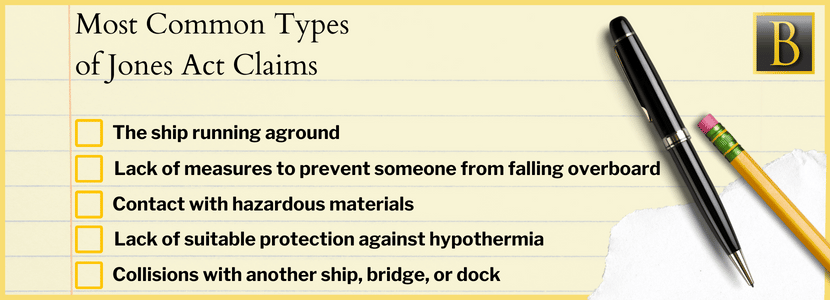The Jones Act is a maritime law that protects workers in maritime jobs, such as the oil rig, shipping, and vessel transportation industries. If you or a loved one has been injured while working on an offshore rig, vessel, or barge outside of Lafayette, Metairie, or any other part of Louisiana, you may be eligible for benefits under the Jones Act. A Jones Act lawyer can help you file a claim and get the compensation you deserve. Read on to find out if you may be eligible.
What Is the Jones Act?
The Jones Act, also referred to as the Merchant Marine Act of 1920, is a United States law that functions as a tariff and shipping regulation, as well as a nationwide standard protecting seamen in a variety of industries.

The big-picture purpose of the Jones Act is to protect all of America by ensuring that only American-built, -owned, and -operated ships can transport goods between U.S. ports. Protecting maritime workers from injury or death due to negligence of their employers is a smaller aspect of the Jones Act but a vitally important part to seamen and their loved ones.
Who Created the Jones Act?
The Jones Act is a federal law named for Senator Wesley L. Jones of Washington state. As mentioned above, protecting maritime workers from injury or death as a result of negligence is a fraction of the Jones Act. In fact, Senator Jones originally proposed the Merchant Marine Act of 1920 as a means of boosting the shipping industry in the years after World War I.
The Act made it so that cargo and goods could only be transported to U.S. ports on U.S. ships. This had a huge economic benefit for Senator Jones’ home state, which had a booming shipping industry at the time. However, it resulted in more expensive shipping costs for other U.S. states and territories, a common complaint that is still made today.
Eventually, the Jones Act was expanded to provide vessel crew members and certain other marine workers with compensation for medical expenses and lost wages in the event of injury or death on the job. It also grew to allow these workers the ability to file claims for injury settlements against their employers if they believe their injuries were caused by negligence.
Over the years, the Jones Act has helped countless injured workers get the justice and compensation they deserve, and it continues to be an important tool for protecting workers’ rights today. If you have been injured while working on a vessel, you should speak with a Jones Act lawyer to discuss your legal options.
Who Does the Jones Act Protect?
The Jones Act only protects maritime workers that qualify as seamen. Who qualifies as a seaman? According to Cornell’s legal dictionary, a seaman is anyone besides a scientist, sailing school instructor, or sailing school student employed to work on a vessel.
The U.S. Constitution defines a vessel as “every description of watercraft or other artificial contrivance used, or capable of being used, as a means of transportation on water.” This generally includes cargo ships, cruise ships, fishing boats, tankers, freighters, and any other vessel that can move people and/or goods over navigable waters.
Regarding offshore oil rig workers, there has been some debate over whether they’re technically seamen. But based on several court cases, the current law is that oil rigs are vessels because they are capable of navigation, even though they are usually stationary. Therefore, oil rig workers are considered seamen and qualify for protection under the Jones Act.
What Benefits Can Seamen Recieve Under the Jones Act?
The Jones Act provides workers with certain rights, such as the right to maintenance and cure. Maintenance and cure payments cover certain expenses for a worker if they are injured on the job.
Maintenance refers to costs associated with rent or mortgage payments, property taxes, utilities, and food. Cure payments cover costs stemming from the worker’s injuries, like necessary medical treatments and transportation to and from hospitals.
Seamen injured on the job may be entitled to sue one or more negligent parties involved in the accident in order to receive maintenance and cure payments. This includes their employer or manager, the owner of the oil rig or ship on which they were injured, or the manufacturer of a faulty piece of equipment.
In addition to maintenance and cure payments, maritime workers who win their Jones Act case may be entitled to compensation for one or more of the following situations:
- Lost wages
- Medical costs and expenses such as surgery, rehabilitation, medical supplies, or medication
- Permanent disfigurement (if applicable), including hearing loss, eye loss, and/or loss of limbs
- Physical pain and suffering
- Mental pain and suffering
- Lost future earning capacity
- Value of lost employer provided fringe benefits
- Loss of ability to enjoy life and/or take care of yourself normally as before the accident took place
Most Common Types of Jones Act Claims
The majority of Jones Act cases typically involve seamen who were injured due to the negligence of their employer or a co-worker. Negligence can take many forms, but some of the most common types of Jones Act cases involve injuries that occur due to unsafe working conditions, inadequate training, faulty policies and procedures, and substandard equipment.

Other causes for Jones Act claims include:
- Collisions with another ship, bridge, or dock
- The ship running aground
- Contact with hazardous materials
- Lack of suitable protection against hypothermia
- Lack of measures to prevent someone from falling overboard
These kinds of accidents can result in all sorts of injuries. This includes electrocution, burns, sight and/ or hearing injuries, permanent disfigurements such as loss of a limb, and severe injuries to the back, brain, bones, and joints.
Seamen injured on the job should consult with Jones Act attorneys experienced in maritime law to determine what legal rights and options they have for their particular situation.
Unseaworthiness Claims
Under general maritime law, shipowners and operators have a duty to maintain their vessels in seaworthy condition, which means they need to be safe for the crew. A vessel is considered seaworthy when it is fully staffed with trained crew members, has properly functioning equipment that is safe to operate, and is overall suitable for use.
When the shipowner or operator is negligent in their responsibility to make the ship seaworthy, it can put the crew at risk and lead to dangerous accidents.
Slip and fall hazards, defective machinery, poor lighting, and a lack of safety gear are just a few of the conditions that make a vessel unseaworthy. As a result of these unsafe conditions, seamen may experience the types of injuries mentioned above. If a seaman does find themselves a victim of a preventable accident, they can file an unseaworthiness claim alongside a Jones Act claim against the shipowner or operator.
What Can Happen to Someone Who Violates the Jones Act?
The Jones Act is an important tool for ensuring that workers are protected from unsafe working conditions and receive the benefits they’re entitled to if they’re injured on the job. Employers who violate the Act can be held liable for damages, including lost wages, medical expenses, and pain and suffering. They may face different penalties, depending on the type of negligence they’re found responsible for causing.
Gross Negligence
Gross negligence is the most blatant form of neglect, in which one party is found completely responsible for the wrongful injury or death. For example, if an oil rig company manager knows there is a faulty piece of equipment on board or a leak streaming over a stairway and fails to get it repaired. If an employee suffers an injury or death as a result of the issue, the employer can be found guilty of gross negligence, whether they took their time to fix the problem or refused to do so.
Comparative Negligence
If an oil rig company is partially responsible for an injury to one of its employees, but the employee is also partly to blame, this is a case of comparative negligence. For example, if a manager fails to fix a leak streaming over a walkway, but the employee was looking at their phone when they slipped and fell, both parties carry some percentage of responsibility.
Vicarious Negligence
Vicarious negligence refers to a situation in which a secondary party is held liable for the negligence of the first. For example, when a parent is held responsible for the damages caused by their child who is still a minor. In the case of an oil company, the company would be held responsible for the negligence of one of its employees that resulted in injury to another.
Opponents of the Jones Act
Offshore industries provide 650,000 American jobs, many of which are held by citizens of Lafayette, Metairie, or other parts of Louisiana. While the Jones Act protects all of those American workers, it also contains some controversial regulations regarding what kinds of vessels can be used in U.S. waters and who can own and operate them.
The Act requires U.S. companies to purchase vessels built in the U.S., which tend to be more expensive than foreign-built ones. Many people wish to amend the Jones Act to eliminate this requirement and reduce shipping and transportation costs. In addition, amending this rule could reduce excessive big truck traffic, encourage more overseas shipping, and reduce the need for cross-country shipping.
Other opponents of the Jones Act also critique its employee protections. Some believe it protects maritime workers too much by making it difficult for employers to get rid of employees with subpar job performance. However, some people believe the Jones Act does not provide enough protection for maritime workers.
What Can A Jones Act Lawyer Do for You?
If you have been injured while working on an offshore vessel outside of Lafayette, Metairie, or any other part of Louisiana, you may be able to file a Jones Act claim against your employer. The responsibility for enforcing maritime injury law in Louisiana falls to the Louisiana Coast Guard, but Jones Act attorneys can help you file a case in court and secure the compensation you deserve.
While there’s a statute of limitations for maritime injury cases, you should still contact a Jones Act lawyer as soon as possible to discuss your situation. Attorneys from a Jones Act law firm have experience with these types of cases and can help you understand your rights under the law.
If you’re a maritime worker but don’t qualify as a seaman, there are other maritime laws out there that may cover your injury. Ultimately, contacting a lawyer is the best way to find out which laws apply to your case. That way, you can ensure you receive the compensation you’re entitled to for your wrongful injury.
Ready to Discuss Your Case with Our Jones Act Attorneys?

With more than 25 years of experience representing victims of maritime negligence, The Law Offices of Blaine Barrilleaux knows what it takes to get the offshore injury settlements our clients deserve. If you or a loved one has been injured in an offshore job on the waters outside of Lafayette, Metairie, or any other part of Louisiana, please do not hesitate to contact us today for a free case evaluation. Let us help you fight for your rights and get your life back on track.







